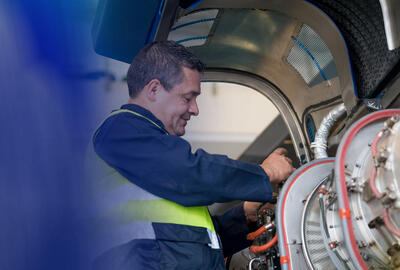Do you have an interview for a mechanical engineer job lined up? Our tips and hints below will help you get the most out of the experience and maximise your chances of landing that coveted new job.
When you receive the details of your interview, check and double check both the location and the time, and ensure that you have copies of any applications or CVs that you have submitted for the role. Make sure you know how to get to the interview and how long it will take, if you want to be really prepared you could even do a test run - we’d only advise this if you live relatively close.
Make sure you leave plenty of time to get there, ideally you’d like to arrive 10 minutes before your interview; if delayed, always call and apologise in advance. Dress smartly, it’s always better to be overdressed than underdressed. Those working in mechanical engineer jobs may not spend a lot of time in a suit on the job, but it is definitely expected for interviews, alongside clean shoes and a neat appearance with a minimal amount of jewellery or make-up.
Once you arrive and during your interview, here are a few tips to make sure that you leave a good impression on your potential employer:
- Positivity always go a long way - being polite and enthusiastic during and after your interview is a must, also try to avoid talking about any personal problems you have or talking negatively about your previous employer.
- Body language - this translates from your handshake during the meet and greet to your posture during the interview. Don’t slouch and maintain eye contact with the person talking to show you’re engaged and interested in the conversation.
- Clarity is key - Answer questions in a clear and concise manner while making sure to also let your personality shine through. If you need some time to gather your thoughts being answer a question, this is completely OK.
7 Mechanical engineer interview questions.
- Where did your interest in a career in mechanical engineering first start?
- What would you say are the most important attributes a good mechanical engineer should have?
- Have you acquired any new engineering skills in the last 12 months?
- What do you think is the most challenging part of being a mechanical engineer?
- What are the most effective ways of measuring the success of a mechanical engineer?
- How would you usual go about attempting to solve an engineering problem?
- Can you pick an engineering concept or problem that would come up in a day’s work and explain it to me as if I am not an engineer?
Further information for mechanical engineer job candidates.
Prospective employers of mechanical engineering or mechanical technician workers will be interviewing to see not only whether candidates have the qualifications to ensure that they can do the job, such as a related degree and/or specific experience, but will also want to ensure that these candidates can implement their knowledge practically, and will fit in with their working environment.
Think about how best to demonstrate that you can be effective within a team, and how you can apply your learning practically in a stressful situation.
Spend some time thinking about how to prove that you can communicate engineering ideas verbally and in written reports, as well as scoping out what further career enhancing qualifications you would be looking to attain in the short to medium term. These will not only increase your own career prospects but also your value to an employer.
General interview questions.
- What would your key strengths and weaknesses be with regard to this type of role?
- What kind of career specific qualifications would you hope to attain over the next few years?
- What most attracted you to this role with us?
- Why do you think your existing experience/education puts you in a good position for this role?
- How do you see your career developing over the next three to five years?
- What do you enjoy most about working in a team?
Scenario interview questions.
- Describe to me the hardest or most challenging engineering project you have worked on so far. What were the key things you learnt from the process?
- Why did you choose these specialisms for your degree? Which did you prefer, and would you change them if you could?




